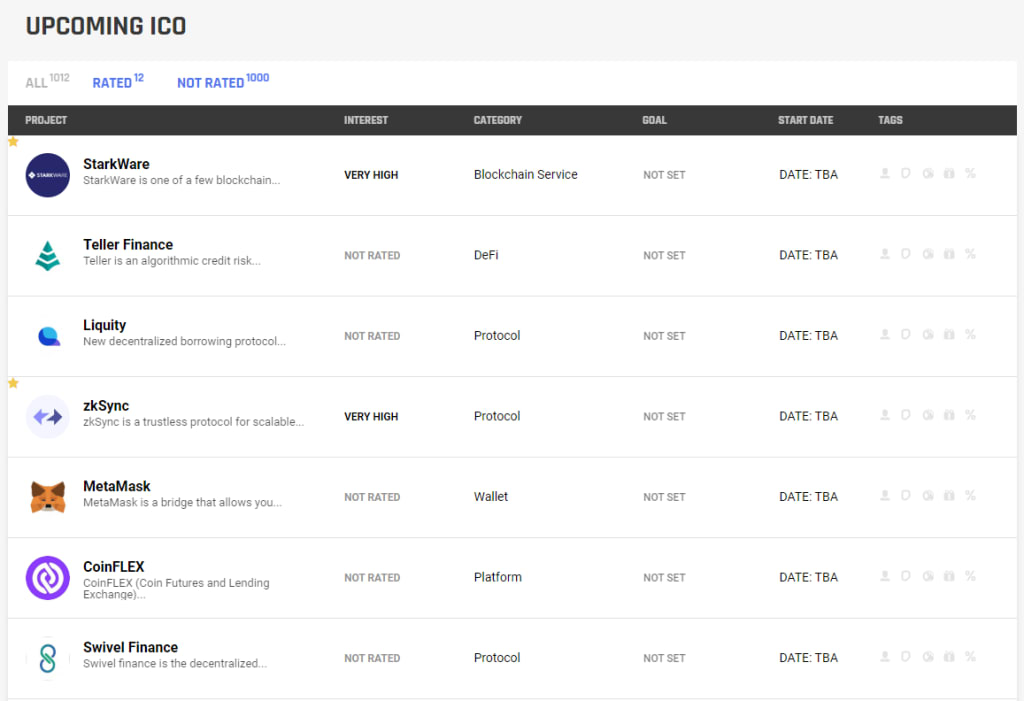Initial Coin Offerings (ICOs)
The Crowdfunding Method for Cryptocurrency Projects

Introduction:
Initial Coin Offerings (ICOs) have emerged as a popular crowdfunding method for cryptocurrency projects, allowing startups and blockchain-based ventures to raise capital by issuing and selling their own digital tokens or coins. ICOs gained significant attention during the cryptocurrency boom of 2017 and have since become an integral part of the blockchain fundraising landscape. In this article, we will explore the concept of ICOs, their benefits, challenges, regulatory considerations, and their impact on the cryptocurrency industry.
What are Initial Coin Offerings (ICOs)?
An Initial Coin Offering (ICO) is a fundraising method in which a company or project sells its own cryptocurrency tokens or coins to investors in exchange for funds. These tokens typically serve as a form of digital assets or utility tokens that may provide access to a platform, product, or service associated with the issuing project. ICOs are often conducted on blockchain platforms, primarily Ethereum, leveraging smart contracts to facilitate the token sale and distribution process.
The Process of ICOs:
Project Concept: The first step in an ICO is the development of a project concept. This involves creating a whitepaper that outlines the project's objectives, technical details, token economics, roadmap, and team members. The whitepaper serves as a prospectus, providing potential investors with information about the project and its potential.
Token Creation: Once the project concept is established, the issuing company or project team creates the digital tokens that will be sold during the ICO. These tokens can have different purposes, such as providing access to a platform, representing ownership in a company, or serving as a digital asset with intrinsic value.
Token Sale and Distribution: The token sale phase begins, during which the project team offers the newly created tokens to investors in exchange for cryptocurrencies like Bitcoin or Ethereum. The sale can be conducted through a website or a dedicated platform, and investors can participate by sending their cryptocurrency to a specified wallet address. The tokens are then distributed to investors based on the amount of cryptocurrency they contributed.
Benefits of ICOs:
Access to Capital: ICOs provide startups and projects with a decentralized and accessible method of raising capital. They allow companies to bypass traditional venture capital routes and directly engage with a global investor base interested in supporting blockchain-based ventures.
Investor Participation: ICOs enable retail investors to participate in early-stage investment opportunities that were traditionally reserved for accredited investors. This democratizes the investment landscape, allowing individuals from various backgrounds to support innovative projects and potentially profit from their success.
Token Liquidity: After the ICO, tokens can be traded on cryptocurrency exchanges, providing liquidity and a potential market for investors. This allows token holders to buy, sell, or trade their tokens freely, potentially realizing gains or losses depending on market demand.
Challenges and Risks:
Regulatory Uncertainty: ICOs have faced regulatory scrutiny in various jurisdictions. Regulators have raised concerns about investor protection, fraud, money laundering, and the potential for unregistered securities offerings. The lack of consistent regulations poses challenges for both project teams and investors, requiring careful compliance measures.
Scams and Fraud: The ICO space has seen instances of scams, fraudulent projects, and misleading information. Investors must exercise caution and conduct thorough due diligence before participating in any ICO. Verifying the legitimacy of the project team, reviewing the whitepaper, and assessing the viability of the project are essential steps to mitigate risks.
Volatility and Speculation: The value of ICO tokens can be highly volatile, subject to market sentiment and speculation. Investors should be aware of the risks associated with investing in a nascent and rapidly changing market, where token prices can experience significant fluctuations.
Lack of Accountability: The decentralized nature of ICOs can make it challenging to hold project teams accountable for delivering on their promises. The success of an ICO project relies on the team's ability to execute their plans, develop the proposed product or service, and create value for token holders.
Regulatory Considerations:
The regulatory landscape surrounding ICOs varies significantly across jurisdictions. Some countries have taken proactive measures to establish frameworks for conducting ICOs and protecting investors, while others have imposed strict regulations or outright bans. Regulatory considerations include securities laws, anti-money laundering (AML) and know-your-customer (KYC) requirements, and investor accreditation rules. It is crucial for project teams and investors to stay informed about the legal and regulatory requirements applicable in their respective jurisdictions.
Impact on the Cryptocurrency Industry:
ICOs have had a profound impact on the cryptocurrency industry. They have facilitated the funding and development of numerous blockchain-based projects, fostering innovation and expanding the ecosystem. ICOs have also highlighted the potential of tokenization, allowing the creation of digital assets that can represent ownership, access rights, or other forms of value. However, the industry has evolved, and Initial Exchange Offerings (IEOs) and Security Token Offerings (STOs) have emerged as alternative fundraising methods that address some of the challenges and regulatory concerns associated with ICOs.
Conclusion:
Initial Coin Offerings (ICOs) have revolutionized the fundraising landscape for cryptocurrency projects, providing an accessible and decentralized method for startups to raise capital. While ICOs have presented exciting opportunities for investors and contributed to the growth of the blockchain industry, they also come with inherent risks and challenges. As the regulatory environment continues to evolve, striking a balance between innovation and investor protection will be crucial for the sustainable development of ICOs and the broader cryptocurrency ecosystem.





Comments
There are no comments for this story
Be the first to respond and start the conversation.